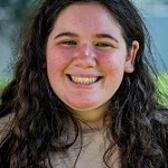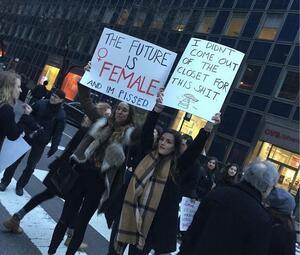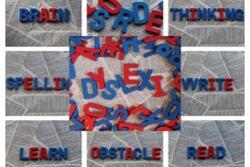Gaping Ideologies at Whole Foods
I’ve spent my formative years in various liberal bubbles, shielded from the reality of a bigoted and unaccepting America. I’ve been fortunate enough to live in New York City, a progressive hub and notoriously accepting city, to spend five summers at Eisner Camp, a Reform Jewish camp where we often discuss gun violence prevention, and to attend the progressive Temple Shaaray Tefila my whole life.
One of my earliest memories is of watching President Obama’s first inauguration with my first-grade class surrounded by my teachers who were clapping and crying. Recently, I’ve been fortunate enough to serve as an intern in the district office of a Democratic congresswoman, where the democratic platform is exemplified. Liberalism was the norm in my life much before I could even pronounce the word “Democrat,” let alone understand the notion of a two-party system. As I’ve grown older and more politically aware, I’ve begun to understand and grapple with the privilege inherent in my identity.
The marches I’ve attended over the past few years never felt frivolous or useless to me until I met a friend from elementary school for lunch last winter. We met at Whole Foods a week or so after the Women’s March, and I asked him if he had attended. He responded by asking me if I was planning on attending the March for Science that was happening later in the spring. I informed him that I was, and had also been the previous year, which seemed to surprise him.
He told me that he was actually too busy to attend the March for Science, but praised me for going to both that and the Women’s March. He expressed his opinion that there were so many fake “SJWs” (“social justice warriors”) who only cared about the Women’s March but never showed up for science, and still dared to complain about climate change or the lack of women in STEM. He went on to discuss “victimization culture,” the gender wage gap that’s truly an “experience gap,” and how so many teens say they’re bisexual or transgender now, when really, they’re just straight and have to stop labeling themselves this early to “look progressive.”
I was beyond shocked. I had made friends at Eisner Camp who lived in conservative areas and had to contend with peers who held bigoted views, but I was completely unprepared to respond to my friend's ideology. My immediate response was a hybrid of confusion and anger, and I told him that I must have misunderstood because he couldn’t possibly believe the misinformation that he had just spewed. When he responded that I was one of those “SJWs” as well because I had supported Hillary Clinton in the 2016 general election over Bernie Sanders, I was speechless. I then tried, without success, to explain the existence of the wage gap and the validity of people’s gender identities and sexualities. After the awkwardly heated discussion, we simply moved on to discussing our siblings, high school lives, and other safer topics.
I texted my school friends afterward, asking what, if anything, I should have done differently. Most of my friends were as dumbfounded as I was, also unsure of what to do in a situation as strange as the one I had just been in. This concerned me just as much as my discussion with my old friend. My friends and I were, and still are, so comfortable in our liberal bubble of New York and our school that we’re woefully unprepared to respond when someone challenges our views.
This encounter revealed how easy it is to blindly accept the political ideologies of those surrounding you, which reminded me of the importance of challenging your own views for the purposes of confirming and reaffirming them. Truthfully, I don’t know if my political leanings would be different if I had been raised in a conservative family or lived in a Republican district. I don’t know the full extent of my city’s political influence on me, which is somewhat jarring because my identity feels so strongly rooted in my socio-political ideology. Is it really just all about where I grew up and who my family and friends are?
I’m not fully sure what I’ll do the next time I see my old friend, but I know that even just the exercise of examining some of my own views more deeply has strengthened them, and allowed me to validate my identity.
This piece was written as part of JWA’s Rising Voices Fellowship.







